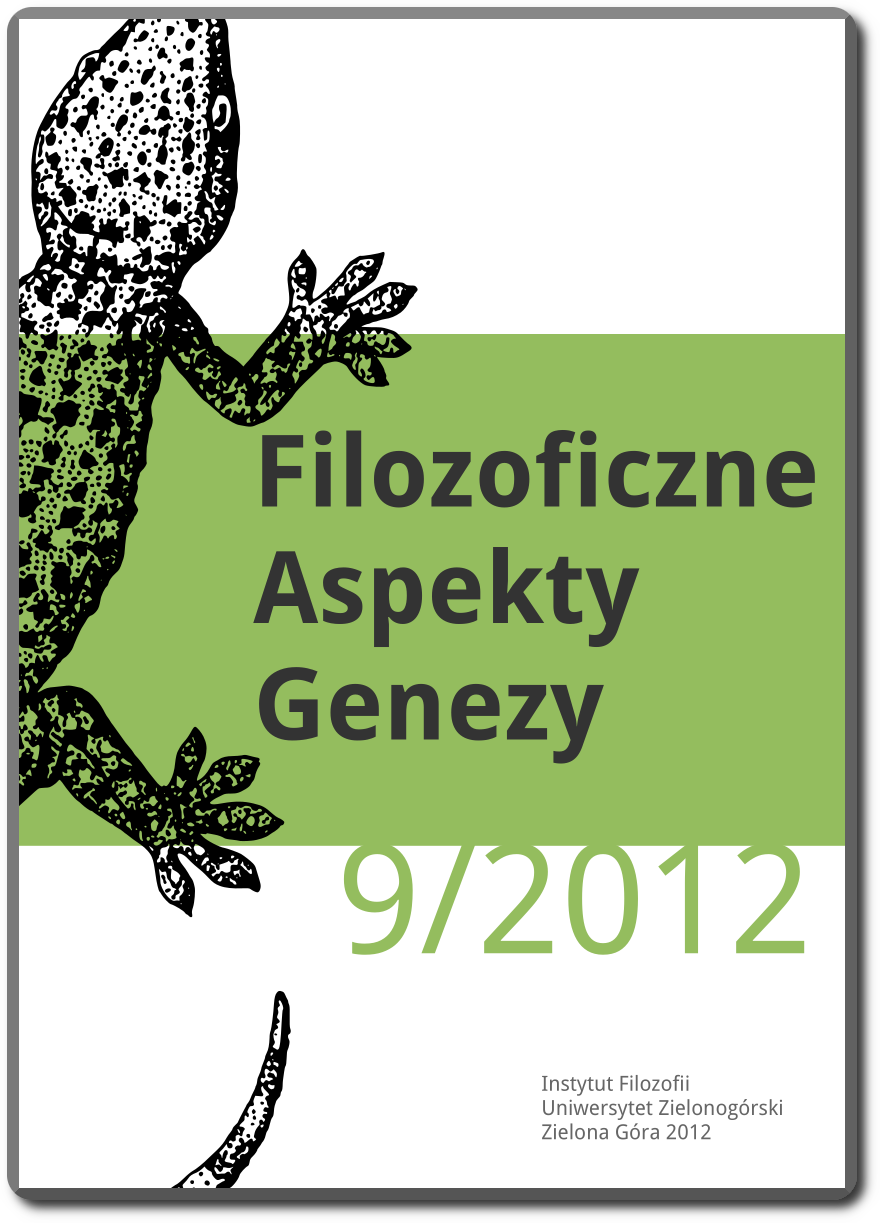Opublikowane 21.05.2021
Słowa kluczowe
- naturalizm metodologiczny,
- naturalizm ontologiczny,
- nauka,
- teologia,
- religia
- teoria ewolucji,
- teoria inteligentnego projektu ...More

Utwór dostępny jest na licencji Creative Commons Uznanie autorstwa 4.0 Międzynarodowe.
Jak cytować
Abstrakt
W niniejszym artykule zajmiemy się wyłącznie metodologiczną odmianą naturalizmu. W ostatnich latach odmiana ta odgrywała znaczącą rolę w obszernej literaturze poświęconej nauce i teologii i to właśnie głównie w tym kontekście chciałbym prowadzić swoje rozważania. Naturalizm metodologiczny nie wysuwa bezpośrednio twierdzenia ontologicznego na temat tego, co istnieje lub nie, lecz wskazuje, jak należy zdobywać wiedzę, a jako model przyjmuje - w ten czy inny sposób - metody nauk przyrodniczych. Wielu autorów piszących o związku nauki i teologii utożsamia naturalizm metodologiczny ze sposobami, w jakie nauka dowodzi swojej wyższości poznawczej nad teologią, przez co stanowisko to staje się przedmiotem ostrej krytyki. Moim zdaniem z biegiem czasu w debacie na ten temat pomieszano kilka różnych spraw. Z punktu widzenia osoby religijnej wielce pomocne byłoby rozróżnienie trzech stanowisk, którym można nadać miano "naturalizmu metodologicznego", przy czym - jak przekonuję - dwa z nich zasługują na aprobatę.
Downloads
Bibliografia
- Gordon Bruce L. and Dembski William A. (eds.), Nature of Nature: Examining the Role of Naturalism in Science, ISI Books, Wilmington, Delaware 2011.
- Armstrong David, „Naturalism, Materialism, and First Philosophy”, w: P.K. Moser and J.D. Trout (eds.), Contemporary Materialism, Routledge, London 1995, s. 35-50.
- Rea Michael, World without Design: The Ontological Consequences of Naturalism, Clarendon Press, Oxford 2002.
- Moser Paul K. and Yandell David, „Farewell to Philosophical Naturalism”, w: W.L. Craig and J.P. Moreland (eds.), Naturalism: A Critical Analysis, Routledge, London 2000, s. 3-23.
- Plantinga Alvin, „Methodological Naturalism?”, w: Jitse van der Meer (ed.), Facets of Faith and Science, vol. 1, University Press of America, Lanham, Maryland 1996, s. 177-221.
- Gould Stephen Jay, Skały wieków. Nauka i religia w pełni życia, przeł. Jacek Biedroń, Wydawnictwo Zysk i S-ka, Poznań 2002.
- Ernan McMullin, „Galileo on Science and Scripture”, w: Peter Machamer (ed.), Cambridge Companion to Galileo, Cambridge University Press, Cambridge 1998, s. 271-347.
- McMulllin Ernan, „Tuning Fine Tuning”, w: J.D. Barrow et al. (eds.), Fitness of the Cosmos for Life, Cambridge University Press, Cambridge 2008.
- McMulllin Ernan, „Biology and the Theology of Human Nature”, w: Phillip Sloan (ed.), Controlling Our Destinies: Perspectives on the Human Genome Project, University of Notre Dame Press, Notre Dame, Indiana 2000, s. 367-393.
- McMulllin Ernan, „Enlarging the Known World”, w: J. Hilgevoord (ed.), Physics and Our View of the World, Cambridge University Press, Cambridge 1994, s. 79-113.
- McMulllin Ernan, „Evolution and Creation”, wprowadzenie do: Ernan McMulllin (ed.), Evolution and Creation, University of Notre Dame Press, Notre Dame, Indiana 1985, s. 1-56.
- „The Integrity of God’s Creation”, część 6. artykułu: Ernan McMulllin, „Plantinga’s Defense of Special Creation”, Christian Scholar’s Review 1991, vol. 21, s. 55-79, przedruk w: R. Pennock (ed.), Intelligent Design Creationism and Its Critics, MIT Press, Cambridge, Massachusetts 2001, s. 165-196.
- Plantinga Alvin, „When Faith and Reason Clash: Evolution and the Bible”, Christian Scholar’s Review 1991, vol. 21, s. 8-31; przedruk w: R. Pennock (ed.), Intelligent Design Creationism and Its Critics, MIT Press, Cambridge, Massachusetts 2001, s. 113- 145.
- McMulllin Ernan, „Scientific Controversy and Its Termination”, w: H.T. Engelhardt and A. Caplan (eds.), Scientific Controversies: Case Studies in the Resolution and Closure of Debates, Cambridge University Press, Cambridge 1987, s. 49-91.
- Clouser Roy A., „On the General Relation of Religion, Metaphysics and Science”, w: Jitse van der Meer (ed.), Facets of Faith and Science, vol. 2, University Press of America, Lanham, Maryland 1996, s. 57-79.
- Ratzsch Del, „Tightening Some Loose Screws: Prospects for a Christian Natural Science”, w: Jitse van der Meer (ed.), Facets of Faith and Science, vol. 2, University Press of America, Lanham, Maryland 1996, s. 175-190.
- Wykstra Stephen, „Have Worldviews Shaped Science? A Reply to Brooke”, w: Jitse van der Meer (ed.), Facets of Faith and Science, vol. 1, University Press of America, Lanham, Maryland 1996, s. 91-111.
- Wykstra Stephen, „Should Worldviews Shape Science?”, w: Jitse van der Meer (ed.), Facets of Faith and Science, vol. 2, University Press of America, Lanham, Maryland 1996, s. 162.



